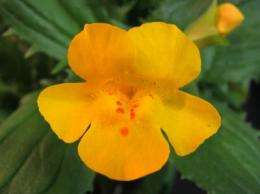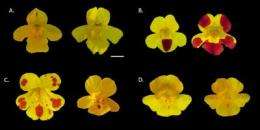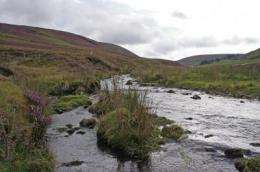Plant overcomes infertility to give rise to a new species in Scotland

A new species of monkey flower, created by the union of two foreign plant species, has been discovered on the bank of a stream in Scotland. Genetic changes in this attractive yellow-flowered hybrid have allowed it to overcome infertility and made it a rare example of a brand new species that has originated in the wild in the last 150 years. Thousands of wild species and some crops are thought to have originated in this way, yet only a handful of examples exist where this type of species formation has occurred in recent history.
The ancestors of the new plant were brought from the Americas as botanical curiosities in the 1800s and were quickly adopted by Victorian gardeners. Soon after their arrival, they escaped the confines of British gardens and can now be found growing in the wild, along the banks of rivers and streams. Reproduction between these species produces hybrids that are now widespread in Britain. Yet, genetic differences between the two parents mean that the hybrids are infertile and cannot go beyond the first generation.

Dr Mario Vallejo-Marin, a plant evolutionary biologist at the University of Stirling, has documented the first examples of hybrid monkey flowers that have overcome these genetic barriers and show fully restored fertility. This fertile hybrid derived from 'immigrant' parents represents a new species, native to Scotland. Dr Vallejo-Marin has chosen to name this species Mimulus peregrinus, which translates as 'the wanderer'. The species is described in the open access journal PhytoKeys.
'The two American monkey flowers are unable to produce fertile hybrids due to differences in the amount of DNA present in each species, the equivalent of getting a sterile mule from crossing a horse and a donkey', said Dr. Vallejo-Marin. 'However, in rare cases, duplication of the entire hybrid DNA, known as polyploidization, can balance the amount of DNA and restore fertility. Our studies suggest that this is what has happened here.'

The discovery will help scientists to understand how new species form. It is thought that many existing plant species including crops such as wheat, cotton and tobacco may have originated in a similar way, but finding examples of this process in action is rare. 'This is an exciting opportunity to study evolution as it happens,' said Vallejo Marin. 'We do not yet know how common the new species is or how well it will fare, so the next step will be to find out its distribution and whether its ecological characteristics, allow it to colonise environments that cannot be currently exploited by its parents.'
More information: Vallejo-Marín M (2012) Mimulus peregrinus (Phrymaceae): A new British allopolyploid species. PhytoKeys 14: 1-14. doi:10.3897/phytokeys.14.3305
Provided by Pensoft Publishers

















